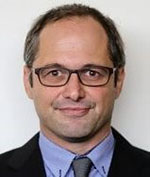2023 UW Medical Data Science Symposium Speaker and Moderator Bios
Many thanks to all of our Symposium speakers and session moderators. Learn more about them below.

Many thanks to all of our Symposium speakers and session moderators. Learn more about them below.
Atul Butte, MD, PhD
Priscilla Chan and Mark Zuckerberg Distinguished Professor of Pediatrics, Bioengineering and Therapeutic Sciences, and Epidemiology and Biostatistics at UCSF
Director, Bakar Computational Health Sciences Institute, UCSF
Chief Data Scientist, University of California Health System (UC Health)
Atul Butte, MD, PhD, is the Priscilla Chan and Mark Zuckerberg Distinguished Professor and inaugural Director of the Bakar Computational Health Sciences Institute (bchsi.ucsf.edu) at the University of California, San Francisco (UCSF). Dr. Butte is also the Chief Data Scientist for the entire University of California Health System, the tenth largest by revenue in the United States, with 20 health professional schools, 6 medical schools, 6 academic health centers, 10 hospitals, and over 1000 care delivery sites.
Dr. Butte has been continually funded by NIH for 20 years, is an inventor on 24 patents, and has authored nearly 300 publications, with research repeatedly featured in the New York Times, Wall Street Journal, and Wired Magazine. Dr. Butte was elected into the National Academy of Medicine in 2015, and in 2013, he was recognized by the Obama Administration as a White House Champion of Change in Open Science for promoting science through publicly available data. Dr. Butte is also a co-founder of three investor-backed data-driven companies: Personalis (IPO, 2019), providing medical genome sequencing services, Carmenta (acquired by Progenity, 2015), discovering diagnostics for pregnancy complications, and NuMedii, finding new uses for drugs through open molecular data. Dr. Butte trained in Computer Science at Brown University, worked as a software engineer at Apple and Microsoft, received his MD at Brown University, trained in Pediatrics and Pediatric Endocrinology at Children’s Hospital Boston, then received his PhD from Harvard Medical School and MIT.

Tim Althoff, PhD
Assistant Professor, Paul G. Allen School of Computer Science and Engineering, University of Washington
Tim Althoff is an assistant professor in the Paul G. Allen School of Computer Science & Engineering at the University of Washington. His research advances computational methods that leverage large-scale behavioral data to extract actionable insights about our lives, health and happiness through combining techniques from data science, social network analysis, and natural language processing.
Tim holds Ph.D. and M.S. degrees from the Computer Science Department at Stanford University, where he worked with Jure Leskovec. Prior to his PhD, Tim obtained M.S. and B.S. degrees from the University of Kaiserslautern, Germany. He has received several fellowships and awards including the SAP Stanford Graduate Fellowship, Fulbright scholarship, German Academic Exchange Service scholarship, the German National Merit Foundation scholarship, a Best Paper Award by the International Medical Informatics Association, the WWW 2021 Best Paper Award, two ICWSM 2021 Best Paper Awards, the SIGKDD Dissertation Award 2019, and an NSF CAREER Award. Tim’s research has been covered internationally by news outlets including BBC, CNN, The Economist, The Wall Street Journal, and The New York Times.

Oliver J. Bear Don’t Walk IV
Postdoctoral Scholar, Biomedical Informatics and Medical Education, University of Washington
Oliver J. Bear Don’t Walk IV is a citizen of the Apsáalooke Nation in present day Montana and is a Postdoctoral Scholar and AIM-AHEAD Research Fellow at the University of Washington in Biomedical Informatics and Medical Education. They completed their PhD in biomedical informatics at Columbia University and received their bachelors in Math and Computational Science from Stanford University. Oliver’s research is at the intersection of clinical natural language processing (NLP), fairness, and ethics with an emphasis on engaging Indigenous communities to improve health in Indian Country. His thesis focused on the technical and ethical aspects of extracting race and ethnicity from clinical notes and identifying biased associations in NLP models trained to extract this information. Oliver is thankful for the community support which has brought him this far, and as such, Oliver pays it forward through teaching and mentorship positions such as serving as an organizer and faculty for IndigiData and a co-chair for the American Medical Informatics Association’s Diversity, Equity, and Inclusion Committee.

Sarah Biber, PhD
Program Director, National Alzheimer’s Coordinating Center
Dr. Sarah Biber is the Program Director for the National Alzheimer’s Research Center (NACC), based at the University of Washington, where she collaborates closely with NACC’s PI and Director, Dr. Walter Kukull, to set the strategic and scientific direction for the center and to oversee the delivery of NACC’s overall scope of work. She also represents NACC with national partners, leads overall operations, and oversees NACC’s tech, research, communications, administrative, and grants and finance teams.
She is trained as a PhD scientist in molecular and cellular biology and has extensive experience leading operations for complex centers and programs focused on advancing research and innovation. Prior to joining NACC in November 2021, she led the Surgical Innovation Program at Oregon Health and Science University (OHSU) where she shaped and significantly expanded the department of surgery’s innovation and entrepreneurship capacity and footprint, including through launching and running the Donald D. Trunkey Center for Civilian and Combat Casualty Care. During this time, she served as a co-investigator on studies that examined the impact of digital health technologies (augmented reality and digital therapeutics) on surgical care and patient experience, and on a grant to develop a novel tele-critical care platform to help address the COVID-19 pandemic. She also contributed to the development of several surgical innovations at OHSU, most notable as a co-inventor of SureFlo, a novel connected wearable blood flow monitoring system.
While at OHSU, she also founded and led the OHSU Invent-a-thon, a novel global virtual extended healthcare hackathon platform that brought together more than 800 innovators across disciplines and 60 academic and industry partners to launch 49 new digital health and medtech solutions to pressing healthcare challenges.
She previously served as the Assistant Director for NIH’s National Center for Data to Health (CD2H), where she was focused on launching the center and leading operations to advance informatics innovation, data sharing, software development, and collaboration across the 50+ Clinical Translational Science Awards Program Centers. Prior to her time at the CD2H, she was Entrepreneurial Program Director at the Oregon Bioscience Incubator where she helped grow the incubator three-fold and spearheaded statewide programs and partnerships to support entrepreneurs and startups. During this period she also served as chair of the Startup Resource Workgroup for the Portland Innovation Quadrant and co-founded Accelerate Biotech and Digital Health PDX.

Beth Britt, PhD
Director of Data & Analytics, UW Medicine
Dr. Britt is the Director of Analytics for UW Medicine, reporting to both School of Medicine BIME Department and UW Medicine IT Services. The Analytics group at UW Medicine is comprised of approximately 50 architects, analysts, developers and administrators managing a set of business intelligence solutions and warehouses. Since joining UW Medicine in May of 2015, Dr. Britt has led efforts to create a predictive analytics function and governance model for the implementation of real-time clinical predictive models. She has also led efforts to develop a new analytics data platform, implement an enterprise-wide data governance model, create analytics intake and prioritization processes, deploy a new data access policy and trainings, prototype new self-service technologies, begin data management work and support Epic business intelligence and cognitive computing implementations.
Dr. Britt holds a PhD in Machine Learning from Washington State University, a Certificate in Data Science from UW, a Lean Six Sigma Green Belt and is a Certified Data Management Professional (CDMP). She has served on Advisory Councils at UW, Microsoft, published in various journals/books and spoken at a variety of conferences and seminars, including recently at Epic UGM.

Trevor Cohen, PhD
Professor of Biomedical Informatics and Medical Education; Adjunct Professor of Psychiatry and Behavioral Sciences, University of Washington
Dr. Cohen trained and practiced as a physician in South Africa, before obtaining his PhD in 2007 in Medical Informatics at Columbia University. His doctoral work focused on an approach to enhancing clinical comprehension in the domain of psychiatry, leveraging distributed representations of psychiatric clinical text. Upon graduation, he joined the faculty at Arizona State University’s nascent Department of Biomedical Informatics, where he contributed to the development of curriculum for informatics students, as well as for medical students at the University of Arizona’s Phoenix campus. In 2009 he joined the faculty at the University of Texas School of Biomedical Informatics, where (amongst other things) he developed a NLM-funded research program concerned with leveraging knowledge extracted from the biomedical literature for information retrieval and pharmacovigilance, and contributed toward large-scale national projects such as the Office of the National Coordinator’s SHARP-C initiative. Since joining the University of Washington in 2018, he has developed additional lines of research including the application of neural language models to identify linguistic anomalies in psychiatric and neurodegenerative conditions, mediate plain language summarization of the biomedical literature, and enhance robustness to provenance-related biases in text categorization.
Research:
Dr. Cohen’s research focuses on the development and application of methods of distributional semantics – methods that learn to represent the meaning of terms and concepts from the ways in which they are distributed in large volumes of electronic text. The resulting distributed representations (concept or word embeddings) can be applied to a broad range of biomedical problems, such as: (1) using literature-derived models to find plausible drug/side-effect relationships; (2) finding new therapeutic applications for known (drug repurposing); (3) modeling the exchanges between users of health-related online social media platforms; and (4) identifying phrases within psychiatric narrative that are pertinent to particular diagnostic constructs (such as psychosis). An area of current interest involves the application of neural language models to detect linguistic manifestations of neurological and psychiatric conditions. More broadly, he is interested in clinical cognition – the thought processes through which physicians interpret clinical findings – and ways to facilitate these processes using automated methods.

Bas de Veer, MS
Assistant Director, UW Medicine Research IT
Bas de Veer, MS, is Assistant Director at UW Medicine Research IT and holds a Bachelor and Masters of Medical Informatics from the University of Amsterdam, Netherlands. He currently oversees both the ITHS REDCap team and the Data Services team.
Bas’s specialty is in translating clinical research needs into practical informatics solutions.

Anind K. Dey, PhD
Professor and Dean, Information School, University of Washington
Anind K. Dey is a Professor and Dean of the Information School at the University of Washington. Anind is renowned for his early work in context-aware computing, an important theme in modern computing, where computational processes are aware of the context in which they operate and can adapt appropriately to that context. His research is at the intersection of human-computer interaction, machine learning, and ubiquitous computing. For the past few years, Anind has focused on passively collecting large amounts of data about how people interact with their phones and the objects around them, to use for producing detection and classification models for human behaviors of interest. He applies a human-centered and problem-based approach through a collaboration with an amazing collection of domain experts in areas of substance abuse (alcohol, marijuana, opioids), mental health, driving and transportation needs, smart spaces, sustainability, and education.
Anind was inducted into the ACM SIGCHI Academy for his significant contributions to the field of human-computer interaction in 2015 and was named an ACM Fellow in 2022. Before starting at the University of Washington in 2018, Anind was the Charles M. Geschke Professor and Director of the Human-Computer Interaction Institute at Carnegie Mellon University for 4 years, and was a member of the faculty for 13 years. Previously, he was a Senior Researcher at Intel Research and an Adjunct Assistant Professor of Computer Science at UC Berkeley. Anind received his PhD and MS in computer science, and an MS in aerospace engineering from Georgia Tech, and a Bachelors in Computer Engineering from Simon Fraser University.

Nic Dobbins
Principal Solutions Architect, UW Medicine Research IT
Nic Dobbins is the Principal Solutions Architect at UW Medicine Research IT and a PhD Candidate in Biomedical Informatics at the University of Washington. Nic is the creator and lead developer of Leaf, a data-model agnostic cohort discovery tool used at UW and universities around the world. Nic’s research interests are at the intersection of natural language processing (NLP), machine learning, question-answering, dynamic query generation, and cohort discovery. Nic is currently working on a new tool, Leaf-AI, which uses natural language criteria to find patients in structured clinical databases.

James Fogarty
Professor, Paul G. Allen School of Computer Science and Engineering, University of Washington
James Fogarty is a Professor of Computer Science & Engineering at the University of Washington and also directs the UW’s cross-campus DUB initiative for HCI and Design. His overall research is motivated by challenges at the intersection of technology and design, where he develops new tools for using data to empower individuals in important domains like health. Recent and ongoing relevant research includes: (1) characterizing burdens and barriers created by current self-tracking technologies, (2) supporting end-to-end processes for collecting and analyzing self-tracking data toward personal data-driven knowledge and decisions, (3) supporting individuals as they collaborate with peers, family, and health providers around self-tracking data, and (4) supporting the design of effective and inclusive health self-tracking applications. His research has examined these technology design challenges in settings that include cancer and depression, food, irritable bowel syndrome, liver disease, migraine, physical activity, and sleep.

Jerry Jarvik
Professor, Radiology and Neurological Surgery; Adjunct Professor, Health Services, Pharmacy and Orthopedics & Sports Medicine, University of Washington; Director, UW CLEAR Center for Musculoskeletal Disorders
Dr. Jarvik attended the University of California, San Diego for both undergraduate education and medical school. He then did his residency in Diagnostic Radiology and fellowship in Neuroradiology at the Hospital of the University of Pennsylvania. He obtained his Masters in Public Health (MPH) from the University of Washington in Health Services while a Robert Wood Johnson (RWJ) Clinical Scholar. He is also a former GE-AUR Radiology Research Academic Fellowship (GERRAF) recipient, a career development award for radiologists.
Currently, Dr. Jarvik is Professor with Tenure of Radiology and Neurological Surgery (joint) at the University of Washington. He is adjunct Professor of Health Systems and Population Health, Pharmacy, and Orthopaedics and Sports Medicine. Dr. Jarvik is the PI/Director of the NIH/NIAMS-funded UW Clinical Learning Evidence And Research (CLEAR) Center for Musculoskeletal Disorders, Co-Director of the Comparative Effectiveness, Cost and Outcomes Research Center (CECORC) and Co-Director of the Health Services Research Section for the Department of Radiology. Dr. Jarvik is an internationally recognized expert in the evaluation of diagnostic and therapeutic spine interventions as well as in the field of health services and comparative effectiveness research as it relates to radiology.

Diane Korngiebel
AI Principles Ethicist and ELSI Scholar, Responsible Innovation, Google
Diane M. Korngiebel has been an ELSI (ethical, legal, and social implications) Scholar and AI Ethicist on the Responsible Innovation Team at Google since May 2022. Dr. Korngiebel started with Google in Oct. 2021 as a Bioethicist on the Google Bioethics team and was a Research Scholar at The Hastings Center, an independent, non-partisan, non-profit bioethics center in Garrison, New York, the previous year. Before joining The Hastings Center in 2020, she was an Associate Professor in the Department of Biomedical Informatics and Medical Education and an adjunct Associate Professor in the Department of Bioethics and Humanities at the University of Washington School of Medicine in Seattle; she maintains affiliate faculty status in both UW departments.
Her interests include the ethics of using AI for health and wellness applications, broadly construed, and the potential and limitations of Big Data science, and appropriate (and inappropriate) design and deployment of digital health and wellness applications.
Dr. Korngiebel’s work has appeared in the American Journal of Public Health, Nature: Genetics in Medicine, NPJ Digital Medicine, and PLoS Genetics. She was recently the principal investigator on a grant funded by the National Human Genome Research Institute and the National Institutes of Health’s Office of the Director on developing an ethics framework to guide biomedical data scientists constructing data models and algorithms. She chairs the AMIA ELSI Working Group and serves on the AMIA Ethics Committee. She has a social sciences doctorate in history from the University of Oxford.

Nathan Kutz, PhD
Professor of Applied Mathematics and Electrical and Computer Engineering; Director, AI Institute in Dynamic Systems, University of Washington
Nathan Kutz is the Yasuko Endo and Robert Bolles Professor of Applied Mathematics and Electrical and Computer Engineering and Director of the AI Institute in Dynamic Systems at the University of Washington, having served as chair of applied mathematics from 2007-2015. He received the BS degree in physics and mathematics from the University of Washington in 1990 and the Phd in applied mathematics from Northwestern University in 1994. He was a postdoc in the applied and computational mathematics program at Princeton University before taking his faculty position. He has a wide range of interests, including neuroscience to fluid dynamics where he integrates machine learning with dynamical systems and control.

Daniel McDuff, PhD
Staff Research Scientist, Consumer Health Research Team, Google; Affiliate Professor, University of Washington
Daniel McDuff is a Staff Research Scientist at Google and Affiliate Professor at the University of Washington. Daniel completed his PhD at the MIT Media Lab in 2014 and has a B.A. and Masters from Cambridge University. Previously, Daniel worked at the UK MoD, was Director of Research at MIT Media Lab spin-out Affectiva. His work has received nominations and awards from Popular Science magazine, South-by-South-West, The Webby Awards, ESOMAR and the Center for Integrated Medicine and Innovative Technology (CIMIT).
His projects have been reported in many publications including The Times, the New York Times, The Wall Street Journal, BBC News, New Scientist, Scientific American and Forbes magazine. Daniel was named a 2015 WIRED Innovation Fellow, an ACM Future of Computing Academy member. Daniel has published over 150 peer-reviewed papers on machine learning (NeurIPS, ICLR, ICCV, ECCV, ACM TOG), biomedical engineering (TBME, EMBC) and human-computer interaction (CHI, CSCW, IUI). Daniel is also co-founder of RAIL, a collaboration that creates AI licenses for the responsible use of AI (https://www.licenses.ai/blog) that are now being used by many publicly available AI models (e.g., stablediffusion).

Shannon McWeeney, PhD
Chief Data Officer, Professor and Vice Chair, Department of Medical Informatics and Clinical Epidemiology, Oregon Health and Science University
Shannon McWeeney, PhD, is a Professor and Vice-Chair in the Department of Medical Informatics and Clinical Epidemiology at Oregon Health and Sciences University. She served as the Head of the Division of Bioinformatics and Computational Biology for 12 years, co-leading the creation of the graduate program in Bioinformatics and Computational Biomedicine, which is part of OHSU’s NLM T15. She is the inaugural Chief Data Officer for the OHSU Knight Cancer Institute and has a career-long commitment to data sharing and patient engagement. She served as a member of the Enhanced Data Sharing working group for the NCI Blue Ribbon Panel for White House Moonshot Initiative and as a member of the Biden Cancer Initiative Data Sharing and Patient Empowerment workstream. In 2010, she was selected as a Kavli Frontiers Fellow by the US National Academy of Sciences. Her work is at the intersection of computer science, biostatistics, genetics and medicine to develop approaches to solve research bottlenecks, as wells as novel ways to visualize and interpret information. She is currently M-PI for OHSU’s Acquired Resistance to Therapy Network (ARTNet) center, M-PI for the Bridge2AI AI-READI Tools module, co-chairs the NHGRI Genomic Data Science Working Group and serves on the American Society for Hematology Artificial Intelligence Task force.

Sean Mooney, PhD
Professor, Biomedical Informatics and Medical Education, University of Washington; Chief Research Information Officer, UW Medicine; Interim Director, UW Institute for Medical Data Science; Director of Biomedical Informatics, Institute of Translational Health Science; Associate Director, National Alzheimer’s Coordinating Center (NACC)
Dr. Sean Mooney is the Chief Research Information Officer (CRIO) of UW Medicine, the Director of Informatics for the Institute of Translational Health Sciences, an Associate Director of the National Alzheimers Coordinating Center (NACC), and a Professor in the Department of Biomedical Informatics and Medical Education at the University of Washington. As CRIO, he leads the growing Research Information Technology team that contributes to a number of national research networks the National Kidney Precision Medicine Project, the National Alzheimer’s Coordinating Center, the UW Clear Center and others. Some notable efforts include leading the team that developed the open source Leaf application for clinical data querying and extraction, managed a REDCap instance with >25k projects and >15k active users, managing the FH, UW and Seattle Cancer Care Alliance joint CTMS application, and enhancing the UW Medicine EDW with advanced analytics including NLP. Currently he is focusing on developing an Epic EHR Research team for supporting research in the EHR at UW Medicine and leading the newly founded UW Institute for Medical Data Science.
His research interests focus on data science applications in biomedicine, particularly in understanding the underlying molecular causes of inherited genetic diseases and cancer. Over his career he has been on the faculty at the Indiana University, the University of Washington and the Buck Institute and has taught at Stanford University, UCSF, and the University of California Berkeley. He is an expert in a wide range of STEM fields, having been trained in chemistry and computer science, and appointed at different times in his career as a faculty member in many areas including genetics, microbial biology, informatics, and gerontology. A prolific speaker, he has given more than 150 invited seminars throughout the world.
Dr. Mooney is a 4th generation Seattleite and in his spare time he is found in the outdoors having climbed Mt. Rainier and Mt. Baker and has bicycled across the United States twice.

Eric Neil
Chief Information Officer (CIO), UW Medicine IT Services
Eric was named the interim CIO in January 2020 and later named the permanent CIO in October 2021. He leads the UW Medicine IT Services department and provides technology leadership for patient care, medical education, and research across the UW Medicine health system.
Prior to the CIO position, Eric served UW Medicine as a trusted consultant in a number of interim leadership roles including Chief Administrative Officer, Program Director, and Revenue Cycle Director. He led several key UW Medicine initiatives including the implementations of an enterprise electronic health record, enterprise billing system, and integration of IT teams.
Before joining UW Medicine, Eric spent 25 years as a Principal Consultant at LaPlant Consulting Group, a healthcare revenue cycle and technology consulting firm based in Seattle. He served hospitals and academic health system clients with interim technology and revenue cycle leadership and numerous successful consulting engagements.
Previous to his consulting work, Eric also served in leadership roles at Virginia Mason Medical Center and Lincare Holdings.
Eric earned his BA in Health Services Administration from Eastern Washington University.

Shwetak Patel, PhD
Washington Research Foundation Endowed Professor, Paul G. Allen School of Computer Science & Engineering
Shwetak is currently the Washington Research Foundation Entrepreneurship Endowed Professor in the Paul G. Allen School of Computer Science & Engineering and the Department of Electrical & Computer Engineering at the University of Washington, where he directs the Ubicomp Lab. Concurrently, he also leads Health Technologies at Google and is a Distinguished Scientist. His research is in the areas of Human-Computer Interaction, Ubiquitous Computing, and Sensor-Enabled Embedded Systems, with a particular emphasis on the application of computing to health, sustainability, and interaction.
Shwetak received his PhD in Computer Science from Georgia Tech in 2008. He is a recipient of a MacArthur Fellowship, Sloan Fellowship, Microsoft Research Faculty Fellowship, MIT TR-35 Award, World Economic Forum Young Global Scientist Award, NSF Career Award, Presidential PECASE award, and the ACM Prize in Computing. He is also an ACM Fellow. Shwetak is a co-founder of a home energy monitoring company called Zensi (acquired by Belkin in 2010), a low-power home wireless sensing company called SNUPI Technologies (acquired by Sears in 2015), and a mobile health company called Senosis Health (acquired by Google in 2017).

Shirley Ren, PhD
Applied Research Manager, Health AI Team, Apple
Shirley graduated from UW in 2015 with a PhD in Statistics. She joined Apple Health AI team in 2019 leading a team of applied research scientists working on health projects.

Mark Richards, PhD
Provost and Executive Vice President for Academic Affairs, University of Washington
Mark Richards joined the University of Washington as provost and executive vice president for academic affairs in 2018. A geophysicist, Dr. Richards also holds a faculty appointment in the College of the Environment’s Department of Earth and Space Sciences.
Dr. Richards came to the UW from the University of California, Berkeley, where he was professor of Earth and Planetary Science. While at Berkeley, he served as dean of mathematical and physical sciences, and simultaneously as executive dean of the College of Letters and Science. For his work on racial, ethnic, and gender diversity in the STEM fields, Dr. Richards received Berkeley’s two highest awards for promoting equity and inclusion.
As the UW’s chief academic and budget officer, Dr. Richards is focusing his leadership on core areas to advance the University’s academic mission. These areas include linking capital investments to academic priorities; replacing the UW’s financial infrastructure; improving mental health services for students; and increasing fellowship support for Ph.D. students.
Dr. Richards’ research centers on dynamic processes in the interior of the Earth and the terrestrial planets, and how these processes affect geological phenomena such as plate tectonics and volcanic eruptions.
He earned his bachelor’s degree in engineering from the University of Texas at Austin, and his master’s and Ph.D. in geophysics from the California Institute of Technology.

Lynn M. Rose, PhD
Affiliate Associate Professor, School of Pharmacy, University of Washington and Drug and Device Advisory Committee Director, Institute of Translational Health Sciences
Lynn Rose is an affiliate associate professor in the UW School of Pharmacy and a founding member of the UW Institute of Translational Health Sciences Drug and Device Advisory Committee, which advises academic investigators on the regulatory requirements for product development. She was previously a senior executive in the biomedical industry, where she was responsible for preclinical, clinical and regulatory programs. This experience included participation on multiple drug development teams, two of which resulted in marketed products for the treatment of cystic fibrosis and two for hemostasis. Rose shares her expertise in biomedical products, clinical protocols, the development of regulatory strategies and the management of regulatory submissions to federal authorities, to students in the master’s degree and the Biomedical Regulatory Affairs Certificate Program.
Rose’s research experience is in the field of immunology, with an emphasis on autoimmunity, infectious disease and immuno-oncology. She earned her PhD in immunology from the University of Geneva, Switzerland.

Dushyant Sahani, MD
Professor and Chair, Department of Radiology, University of Washington
Dushyant Sahani, MD, is a professor and Chair of Radiology at the University of Washington in Seattle, since 2019. He is currently involved in investigating new CT technologies such as multi energy scanners and their impact on patient care, patient safety, healthcare cost and outcomes.
Dr Sahani has contributed over 345 peer reviewed original articles, and reviews to medical literature, numerous book chapters, and has co-edited two textbooks. His work has appeared in journals such as: the New England Journal of Medicine, Nature Medicine, Journal of Clinical Oncology, Hepatology, Radiology, American Journal of Roentgenology, Annals of Surgery, Investigative Radiology, and European Journal of Radiology. He has delivered over 300 lectures nationally and internationally. He has been a visiting professor at numerous universities in the United States and abroad. He served as 2008-2009 “Visiting Professor” of the Society of Abdominal Radiology and the 2016 International Visiting Professor for the Radiological Society of North America.
He is an associate editor for Abdominal Imaging, serves on the editorial board of JCAT and is a reviewer for over 25 scientific journals. Dr Sahani is also a fellow member of all leading radiological societies including: ACR, ARRS, CMR, ESGR, NERRS, RSNA, SABI (formerly SCBT/MR), and SGR. In 2005 and 2007, he earned a research award from the Society of Gastrointestinal Radiology, and a Hounsfield award from the Society of Computed Body Tomography and MR in 2005. Dr. Sahani is the past president of SCBT-MR and Vice President for International Society of Computed Tomography (ISCT).

Scott Saponas
Senior Director, Microsoft Research, Biomedical Computing

Ali Shojaie, PhD
Professor and Associate Chair, Department of Biostatistics, School of Public Health, University of Washington
Ali Shojaie is Professor and Associate Chair of Biostatistics, Adjunct Professor of Statistics and founding director of the Summer Institute for Statistics in Big Data (SISBID) at the University of Washington. Originally trained in Industrial and Systems Engineering, he obtained his PhD in Statistics from the University of Michigan, while completing Masters degrees in Applied Mathematics and Human Genetics. Dr. Shojaie’s research lies in the intersection of statistical machine learning, statistical network analysis and applications in biology and social sciences. His research has been recognized by multiple best paper awards. He is a recipient of the 2022 Leo Breiman Award from the ASA Section on Statistical Learning and Data Science and elected a Fellow of the American Statistical Association (ASA).

Shawn Sullivan
Cofounder & Chief Technology Officer, Phase Genomics
Mr. Sullivan has served as the CTO of Phase Genomics since its founding in 2015. He heads all software engineering, data science, machine learning, computational biology, and bioinformatics efforts at Phase Genomics. In this capacity, he has led the invention, development, and deployment of multiple technologies, including deep-learning–based models for understanding and diagnosing cancer, machine learning models for assessing antibiotic resistance in microbial communities, predictive models for identifying host relationships for plasmids and phages, and new computational tools for the analysis of chromatin structure, genome assembly, and metagenomics. He received his B.S. in Computer Science & Engineering from MIT, and is a software industry veteran with 8 years of experience designing large-scale data processing and analysis systems as well as leading software development teams at Microsoft.

Peter Tarczy-Hornoch, MD
Chief Data Officer, UW Medicine; Professor and Chair, Department of Biomedical Informatics and Medical Education; Professor, Department of Pediatrics, Division of Neonatology; Adjunct Professor, Department of Computer Science and Engineering, University of Washington
Peter Tarczy-Hornoch has over 40 years of experience in computer science, over 35 years in biomedical informatics and 20 years in clinical medicine (pediatrics and neonatology). He has been at the University of Washington for 30 years, serving as Head of the Division of Biomedical and Health Informatics since 2001 and serving as Chair of the Department of Biomedical Informatics and Medical Education since 2011. He has played a leadership role in the creation and evolution of the BIME educational programs (undergraduate (joint with iSchool), MS/PhD, postdoctoral, applied clinical informatics MS (CIPCT) joint with Nursing, Clinical Informatics Fellowship joint with Family Medicine). He has led a number of key initiatives in informatics practice (praxis) including the areas of telemedicine, digital library, electronic medical records, data warehousing (including seminal work on 1st, 2nd and 3rd generation UW Medicine Enterprise Data Warehouses), analytics, clinical research informatics).
His unifying theme of research over the last two decades has been data integration of electronic biomedical data (clinical, genomic and other including data) both for a) knowledge discovery and b) in order to integrate this knowledge with clinical data at the point of care for decision support. His current research focuses on a) secondary use of electronic medical record (EMR) for translational research including outcomes research, learning healthcare systems, based on complex phenotypic eligibility criteria, b) the use of EMR systems for cross institutional comparative effectiveness research, and c) integration of genomic data into the EMR for clinical decision support in the context of translational bioinformatics

Michael Willingham
Director of Regulatory Affairs, Google Health
Michael Willingham is the Director of Regulatory Affairs at Google Health and is involved in using artificial intelligence and machine learning to assist in diagnosing cancer, predicting patient outcomes, preventing blindness, and much more. He is a 20+ year senior executive with 30+ years of experience in the healthcare technology industry, with roles in Regulatory Affairs, Quality Assurance, Information Security, Research, Product Development, Human Resources, and International Business.
Mike brings specific experience in healthcare IT, medical device design and manufacturing, embedded and stand-alone software, management system certifications, total quality management, and worldwide regulatory affairs.
Companies and positions:

Meliha Yetisgen, PhD
Professor, Biomedical Informatics and Medical Education: Adjunct Professor, Department of Linguistics, University of Washington
Meliha Yetisgen is a Professor in the Department of Biomedical Informatics and Medical Education and Adjunct Professor in the Department of Linguistics at the University of Washington. Before joining University of Washington, she worked in industry as a researcher. Her research is on natural language processing (NLP) and its application to clinical domain to enable meaningful secondary use applications. She focuses on defining complex NLP questions on different sources of clinical narratives and developing state-of-the-art text processing approaches to solve them. She uses those NLP solutions to enable clinical secondary use applications that have direct impact on improving quality of patient care and advancing clinical research. Dr. Yetisgen received her BS degree on Computer Engineering from Bilkent University (Ankara, Turkey) and MS degree on Computer Engineering from Middle East Technical University (Ankara, Turkey). She received her PhD from University of Washington.



